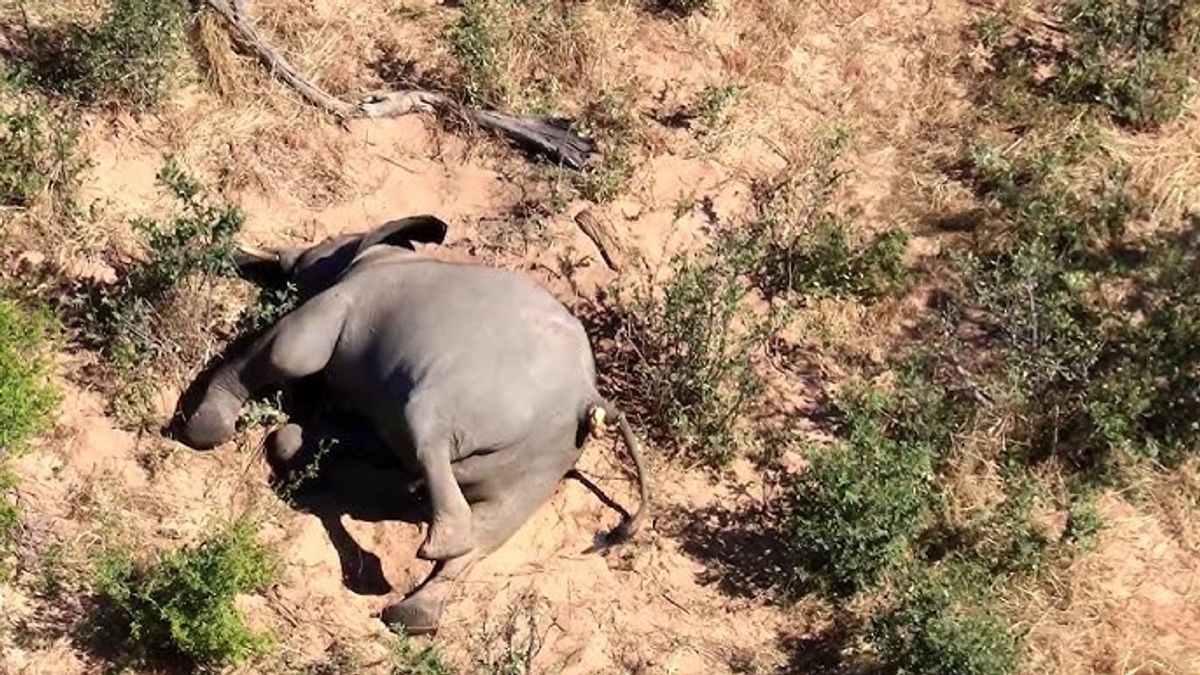JAKARTA - Botswana was once a comfortable home for elephant habitat. The population of elephants increases and animals having long trunks is protected. However, the demand for ivory that rose in the international market changed everything. Botwana elephants are being hunted a lot.
Hunting for elephants has received international attention. However, it was not the only incident where an elephant died. There were other events that caused the elephant to die. Botwana has been confused with the mysterious death of hundreds of elephants.
Not many countries in the world have a comfortable ecosystem for elephants in the world. At least one place must be rich in water, have deserts, and forests that provide food supplies. In particular, all these criteria are present in Botswana.
The country on the African continent has a large elephant population of 130 thousand elephants. The Botswana government provides more protection for elephants. In fact, the fossil elephant population can become the backbone of the national economy through tourism.
Recently, problems arose. Poverty and high demand for elephant tusk became the estuary in the 1990s. The increase in elephant deaths due to the hunting of local residents rose. Hunters are irresponsible. They kill and take advantage of the killing of elephants.
Hunting was increasingly intense in the 2018 era. Hunting for elephants was recorded at 87 in the near future. However, this information was immediately denied by the government. The local government, which has the law to shoot dead elephant hunters since 2013, said that not many elephants died from hunting.
The rest of the elephants died for other reasons. However, the world doesn't just believe it because many elephants die without ivory. The government's commitment to protecting elephants that bring large income is doubtful.
But the government immediately denied the number of the group and the assumption that all dead elephants had been hunted for its tusk, calling the report false and misleading. International survival, which advocates for the rights of indigenous peoples, agrees.
During a visit to Chobe National Park last week, officials counted 19 dead elephants, only six of whom were killed by poachers, the government said. The rest died due to natural causes or conflict with villagers, the government said. Speaking to reporters on the trip, Churchill Collyer, deputy director of the wildlife department, said, "We have not recorded any mass killings," the New York Times website said Doubts Mount in Botswana Over Charity's Claim of Elephant Poaching Frenzy(2018).
The wild hunt for elephants does bring harm to the elephant population in Botswana. However, it was not the worst death. The most severe occurrence of death occurred in 2020. Or in the year of the COVID-19 pandemic greeting the world.
Humans are overwhelmed to death facing COVID-19. Elephants in Botswana also struggle not to die. Because, many elephants were found dead mysteriously in Botswana. Elephants from all walks of life seemed to walk and then faint and die.
This condition made the death of the largest elephant in the near future from May to June 2020. The death shocked the world. Some call it a conservation disaster.
At first the hunt was used as a scapegoat. Recently, research began and the results were not hunting. Researchers from various countries around the world indicate the mysterious occurrence of elephant deaths due to climate change.
Climate change makes bacteria that used to be suspended animation actually mingle with elephant water. As a result, elephants became victims.
SEE ALSO:
This condition is possible because climate change has an extraordinary impact. A population can disappear immediately. In fact, climate change made a place that was previously safe and comfortable to become tense. Everything is because the earth's temperature is getting hotter.
The study provides a convincing explanation of the mass death of elephants that shocked the world in 2020. The research adds to the stronger evidence that climate change can have various deadly effects.
"Especially, in wildlife (as well as livestock and humans), ranging from drastically changing the availability of water, to providing conditions for bacteria and alga are dangerous for breeding and beating the animal population," Phoebe Weston said in her article on The Guardian's website entitled Climate-induced poisoning: 350 Elephants Probably Killed by Toxic Water (2024).
The English, Chinese, Japanese, Arabic, and French versions are automatically generated by the AI. So there may still be inaccuracies in translating, please always see Indonesian as our main language. (system supported by DigitalSiber.id)















